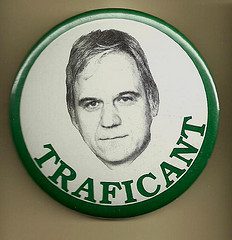Reading Wendell Berry at Costco

So, it was a busy day in Washington, talking about the Benedict Option, and

launching my long-shot bid to be Speaker of the House as a Traficant Whig. Somebody has to represent the Marsupial-Haired-American community on the Hill, yes?
I spoke to the Faith & Law group today, and realized a couple of things after the talk. For one, I met a man whose writing I deeply admire, and with whom I had corresponded over the years, but had never met. (I won’t embarrass him by naming him.) He said he agrees with much of what I say regarding the Benedict Option, but thinks I’m too gloomy and defensive about it. He believes that there is a more positive vision to be articulated here, a vision that’s about a turning-inward towards community as more than an escape, but an actual embrace of liberty. His words reminded me once again that I have a bad habit of coming across as more apocalyptic than I am. Sort of.
I mean, I really do think things are going to get increasingly more difficult for us traditionalist types, both in terms of law and culture, and I find that, to paraphrase Flannery O’Connor, for people who are deaf, you have to shout. That said, anybody who has spent 10 minutes around me knows that I am very far from calling for the Amos Starkadder Option. As a native of south Louisiana, when the hurricane is coming, my instinctive response is to get out the gumbo pot, make a roux, ice down some beer, and invite everybody over to eat. I need to find some way to bring some of that joie de vivre to this dire topic, because I really do feel it.
Second — and I can’t learn this often enough — I really need to articulate better this whole withdrawal thing. People keep hearing me say, “Head for the hills!”, though I don’t believe that. The road to the Benedict Option goes through the Christian philosopher James K.A. Smith, so let me quote from him on the topic. This is from my own notebook. I think this is from his Desiring the Kingdom. Here, Jamie explains what he means by the term “liturgy,” and by “cultural liturgy”:
Liturgies, then, are a certain species of practice. More specifically, I want to distinguish liturgies as ‘rituals of ultimate concern’: rituals that are formative for identity, that inculcate particular visions of the good life, and do so in a way that means to trump other ritual formations. Admittedly this might include rituals not associated with traditional religions (e.g., rituals of Nazi fascism or other rituals of totalizing nationalism); indeed, expanding our conception of what counts as ‘worship’ is precisely the point. Our thickest practices — which are not necessarily linked to institutional religion — have liturgical function insofar as they are a certain species of ritual practice that aim to do nothing less than shape our identity by shaping our desire for what we envision as the Kingdom — the ideal of human flourishing.
Liturgies are the most loaded form of human practice because they are after nothing less than our hearts. They want to determine what we love ultimately. By ‘ultimately,’ I mean what we love ‘above all,’ that to which we pledge allegiance, that to which we are devoted in a way that overrules other concerns and interests. Our ultimate love is what defines us, what makes us the kind of people we are. In short, it is what we worship. Another way of putting this, in terms we’ve used before, is to say that liturgies are ritual practices that function as pedagogies of ultimate desire.
The Benedict Option may be understood as deepening our commitment to Christian “liturgies,” as Jamie uses the word: not only the formal practice of religion, but the practices of everyday life, in family and community, to orient ourselves more thoroughly to God and His service. Jamie contends that we have to stop paying so much attention to what we say and think, and more to what we do, because practices are the way these cultural liturgies sink down into our marrow. The Benedict Option is the liturgization of our lives — and that requires a withdrawal from the liturgies we now inhabit.
But what does that withdrawal mean? Does it require us to move to the countryside? I don’t think it does. Jamie’s sequel, Imagining the Kingdom, sheds more light on the subject. In it, he writes of conversion (or, if you prefer, discipleship) as not simply about processing information, but about formation. True conversion is not simply an intellectual assent to theological propositions, but the instantiation of those propositions into our lives, such that we emerge over time with new habits, desires, and virtues.
The imagination shapes our identity and governs our orientation to the world. “Education is also about formation (‘aiming’) of our love and desire,” he writes, and “such formation happens through embodied, communal rituals we call liturgies — including a range of ‘secular’ liturgies that are pedagogies of desire.”
More, on the limits of merely adjusting your worldview:
A worldview approach would assume that the proper response to a disordered mindless eating is mindful eating, as if simply getting the right perspective on eating is sufficient. … We have a tendency … to overestimate the importance of thinking.
… The driving center of human action and behavior is a nexus of loves, longings, and habits that hums along under the hood without needing to be thought about.
More:
A way of life becomes habitual for us such that we pursue that way of life — we act in that way of life — without thinking about it, because we’ve absorbed the habitus that is oriented to a corresponding vision of “the good life.” Indeed, because this becomes sedimented into my background, I can’t even see the world otherwise; this way of seeing it just seems “obvious,” and I don’t even feel the call to be otherwise. I fail to resist temptation, not because I’ve made a bad decision, but because I’ve failed to recognize that I’m being malformed by a constellation of cultural “disciplines” that are disciplining me otherwise.
The Benedict Option requires us to embrace what Jamie calls “intentionally decentering practices” — that is, practices that release us from centering around the Self, as all the secular liturgies of our time do, and re-center us around God.
Here’s the key: if we are going to serve God as we are called to do, we have to be decentered from our Selves. And that requires entering into the life of the community that teaches us, through its practices, to do that. Here’s the heart of it:
We worship for mission; we gather for sending; we center ourselves in the practices of the body of Christ for the sake of the world; we are reformed in the cathedral to undertake an image-bearing commission to reform the city.
It’s like what Marco the Lombard tells the pilgrim Dante in Purgatorio: If you want to reform the world, start by re-forming your own heart.
One more thing from Jamie. He says that if we Christians are going to be in the world but not of it, we have to practice a form of withdrawal. Jamie, writing out of the Reformed tradition, cites Calvin:
So while Calvin does not advocate a retreat from “the world” to the desert, he still emphasizes the set-apart-ness of the Christian life. As Boulton so well summarizes it, “For Calvin, Christian life does involved being set apart, not via a geographical, social retreat to a monastic campus, but rather via a moral, existential brand of practical withdrawal from “the world” and “the depravity of disposition.” That is, Calvin envisions a reformed way of life robustly engaged in ordinary affairs that is nevertheless unconformed to the prevailing patterns and protocols, in effect a dispositional deflection from the world while remaining ensconced within it.
I get that. That’s what I believe the Benedict Option calls for. Yet we will need time in the desert, metaphorically speaking, for contemplation, so we can be recharged and re-centered for our action in the world. If, however, being in the world in a particular way proves to be a separation from God, then we have to physically withdraw. It will be very easy to lie to ourselves about this. Jamie:
It is not enough to convince our intellects; our imaginations need to be caught by — and caught up into — the Story of God’s restorative, reconciling grace for all of creation. It won’t be enough for us to be convinced; we need to be moved. Otherwise we’ll just be reading Wendell Berry in Costco; we’ll be convinced but not transformed.
Hey folks, come out on Saturday October 10 to Gaston Hall at Georgetown University (37th and O St., NW) to talk with Ken Myers and me and a bunch of your nascent Ben Oppers about the Benedict Option. 10 am till 12:30.
Subscribe for as little as $5/mo to start commenting on Rod’s blog.